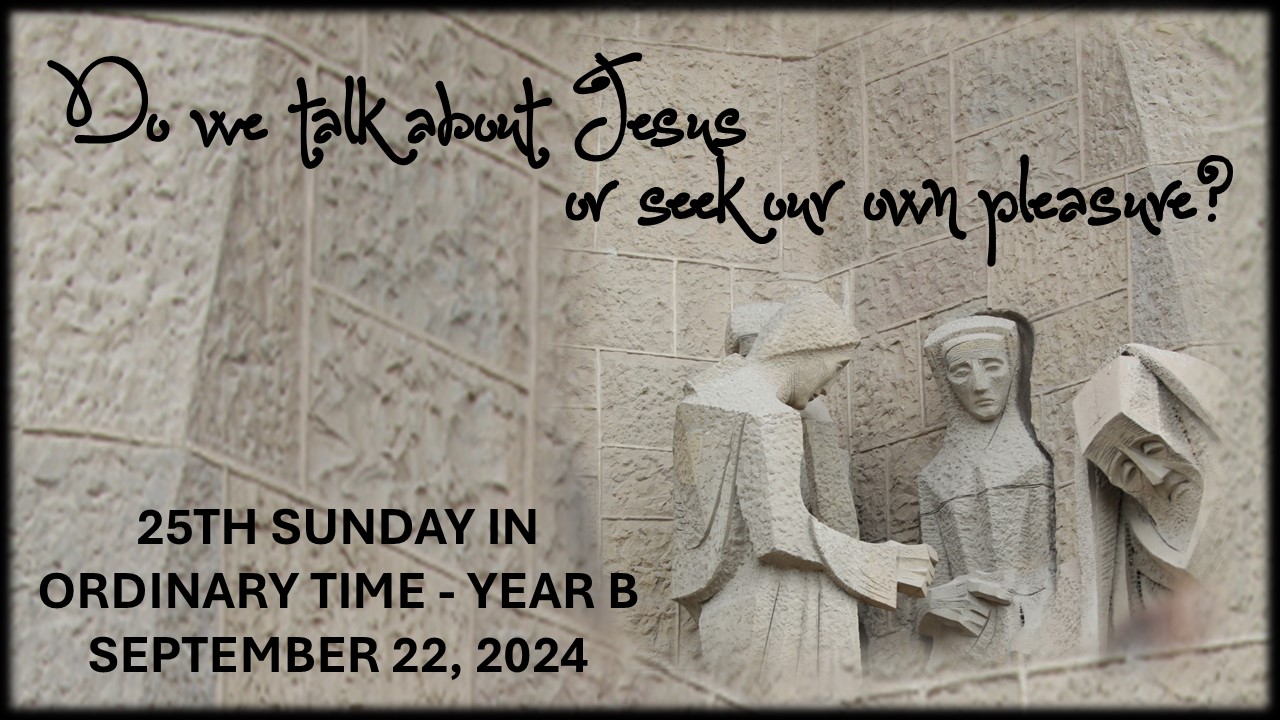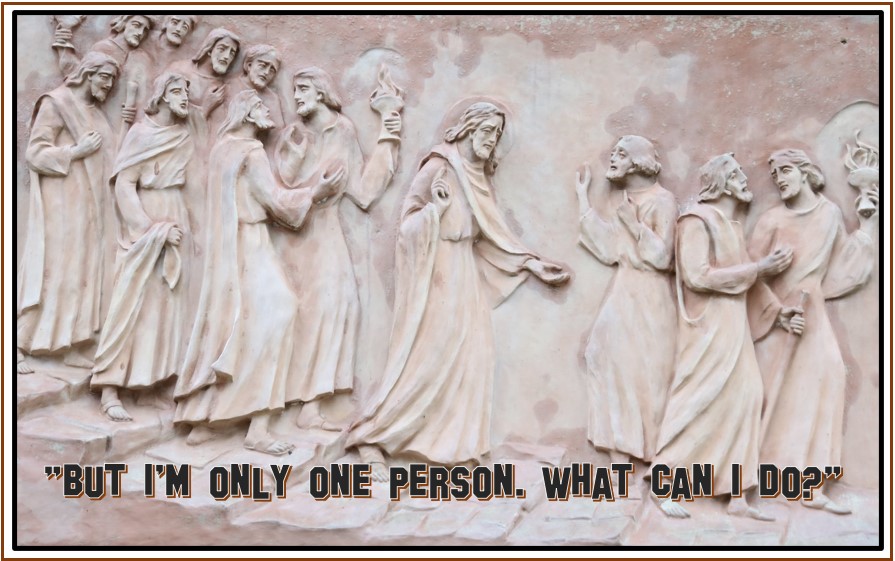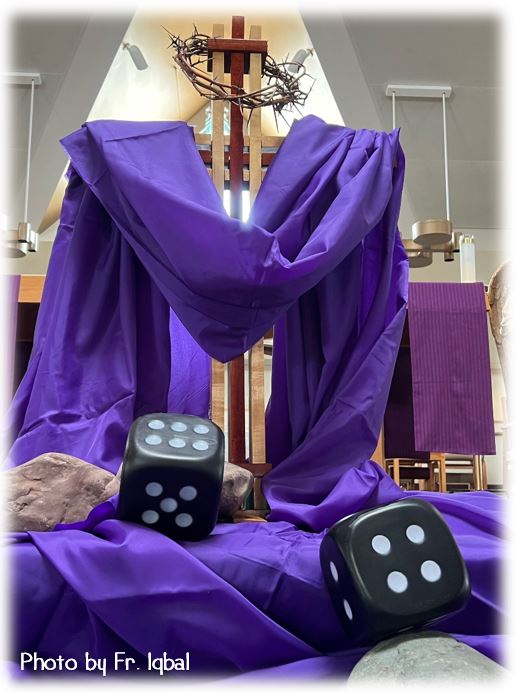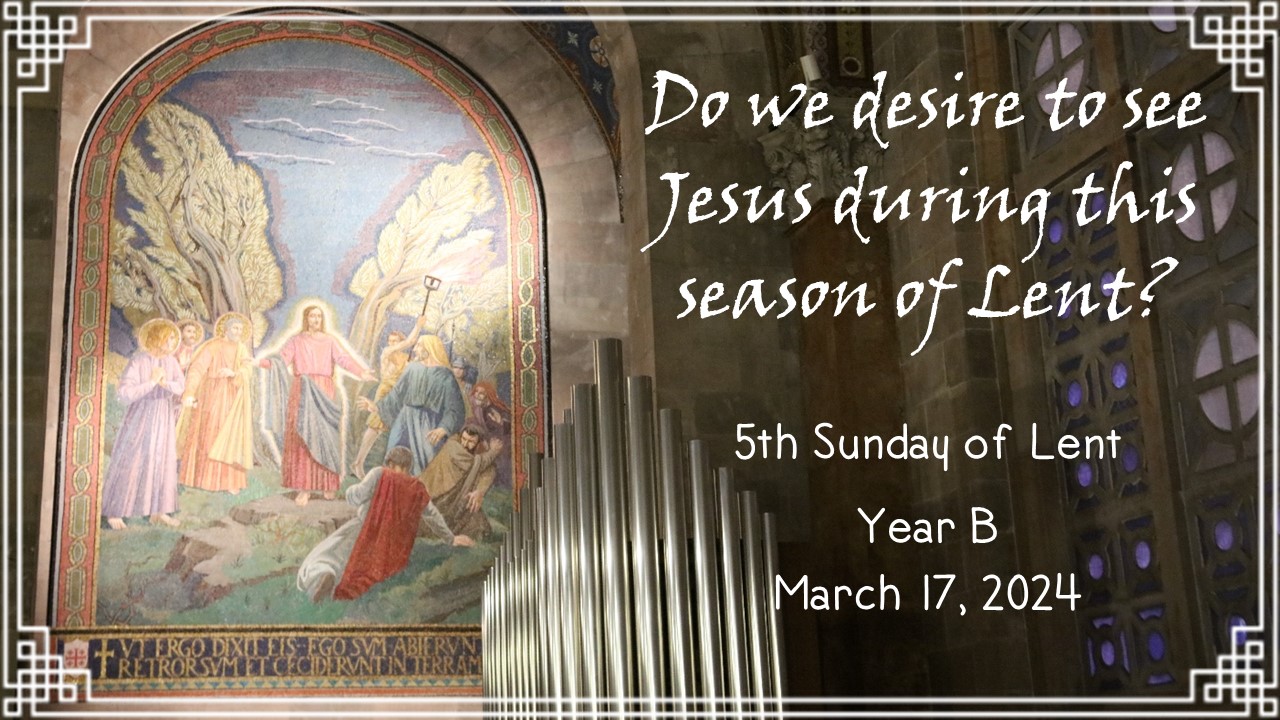
25TH SUNDAY IN ORDINARY TIME, YEAR B ~ SEPTEMBER 22, 2024
LET’S TALK ABOUT JESUS
As we continue our faith journey, every day through the Sacred Scripture Reading, the Lord opens our hearts and minds to deepen our faith and relationship with him. During the month of September, we celebrate various Marian feast days including the birthday of Blessed Virgin Mary who is our role model to listen and obey. Last Sunday with St. Peter we confessed that Jesus is our Saviour because he is Christ.
Prophet Ezekiel’s story of calling is very interesting to understand our own call to speak what the Lord wants us to speak. The Lord spoke to me and said: As for you, son of man, obey me when I speak to you, be not rebellious like this house of rebellion, but open your mouth and eat what I shall give you. It was then I saw a hand stretched out to me, in which was a written scroll which he unrolled before me. It was covered with writing front and back and written on it was Lamentation and wailing and woe! He said to me: Son of man, eat what is before you; eat this scroll, then go, speak to the house of Israel. So, I opened my mouth, and he gave me the scroll to eat. Son of man, he then said to me, feed your belly and fill your stomach with this scroll I am giving you. I ate it, and it was as sweet as honey in my mouth. He said: Son of man, go now to the house of Israel, and speak my words to them. Not to a people with difficult speech and barbarous language am I sending you, nor to the many peoples with difficult speech and barbarous language whose words you cannot understand. If I were to send you to these, they would listen to you; but the house of Israel will refuse to listen to you, since they will not listen to me. For the whole house of Israel is stubborn of brow and obstinate in heart. But I will make your face as hard as theirs, and your brow as stubborn as theirs, like diamond, harder than flint. Fear them not, nor be dismayed at their looks, for they are a rebellious house. Son of man, he said to me, take into your heart all my words that I speak to you; hear them well. Now go to the exiles, to your countrymen, and say to them: Thus says the Lord God! whether they heed or resist! Thus, the word of the Lord came to me: Son of man, I have appointed you a watchman for the house of Israel. When you hear a word from my mouth, you shall warn them for me. If I say to the wicked man, you shall surely die; and you do not warn him or speak out to dissuade him from his wicked conduct so that he may live: that wicked man shall die for his sin, but I will hold you responsible for his death. If, on the other hand, you have warned the wicked man, yet he has not turned away from his evil nor from his wicked conduct, then he shall die for his sin, but you shall save your life. If a virtuous man turns away from virtue and does wrong when I place a stumbling block before him, he shall die. He shall die for his sin, and his virtuous deeds shall not be remembered; but I will hold you responsible for his death if you did not warn him. When, on the other hand, you have warned a virtuous man not to sin, and he has in fact not sinned, he shall surely live because of the warning, and you shall save your own life.
Two men visit a Zen master.
The first man says: “I’m thinking of moving to this town. What’s it like?”
The Zen master asks: “What was your old town like?”
The first man responds: “It was dreadful. Everyone was hateful. I hated it.”
The Zen master says: “This town is very much the same. I don’t think you should move here.”
The first man leaves, and the second man comes in.
The second man says: “I’m thinking of moving to this town. What’s it like?”
The Zen master asks: “What was your old town like?”
The second man responds: “It was wonderful. Everyone was friendly and I was happy. Just interested in a change now.”
The Zen master says: “This town is very much the same. I think you will like it here.”
What we seek is what we find. The reasons why you do what you do matter as much, if not more, as what you end up doing. Because they shape how you seek. So, ultimately, they’ll also determine what you find.
What do we talk every day? How do we talk? Why do we talk? About whom do we talk? These are questions we face every day of our life. We do we talk positive & constructive things to strengthen other people or negative & destruction things to put other people down. As it is written in the Book of Sirach (28:1-26) “If you blow on a spark, it will glow; if you spit on it, it will be put out; yet both come out of your mouth. Curse the gossips and the double-tongued, for they destroy the peace of many. The blow of a whip raises a welt, but a blow of the tongue crushes the bones. Many have fallen by the edge of the sword, but not as many as have fallen because of the tongue. As you fence in your property with thorns, so make a door and a bolt for your mouth. As you lock up your silver and gold, so make balances and scales for your words. Take care not to err with your tongue and fall victim to one lying in wait”.
St. James the Apostle on the other hand compares tongue with fire “How great a forest is set ablaze by a small fire! And the tongue is a fire. The tongue is placed among our members as a world of iniquity; it stains the whole body, sets on fire the cycle of nature, and is itself set on fire by hell. For every species of beast and bird, of reptile and sea creature, can be tamed and has been tamed by the human species, but no one can tame the tongue—a restless evil, full of deadly poison. With it we bless the Lord and Father, and with it we curse those who are made in the likeness of God. From the same mouth come blessing and cursing. My brothers and sisters, this ought not to be so. Does a spring pour forth from the same opening both fresh and brackish water? Can a fig tree, my brothers and sisters, yield olives, or a grapevine fig? No more can saltwater yield fresh” (3:1-12).
I believe positive and healthy talks not only change other people but also, they do change us as well. We are living in a time or world where mainstream and social media has spread so much negativity that people have forgotten to respect and believe other people. In fact, through negativity comes envy and greed and when these two become strong and overtake our thoughts and feels then we don’t spare to harm other people. This is the message we are receiving from the Word of God this week. Remember God always talks to us to remind us that he loves and loves unconditionally. Someone wrote this inspiring note which I would like to share with you all. This a letter God has written to us all.
“I am God. Today, I will be handling all your problems. Please remember that I do not need your help. If life happens to deliver a situation to you that you cannot handle, do not attempt to resolve it. Kindly put it in the SFGTD (something for God to do) box. All situations will be resolved in My time, not yours.
Once the matter is placed into the box, do not hold onto it by worrying about it. Instead, focus on all the wonderful things that are present in your life now.
If you find yourself stuck in traffic, don’t despair. There are people in this world for whom driving is an unheard-of privilege.
Should you have a bad day at work, think of the man who has been out of work for years.
Should you despair over a relationship gone bad, think of the person who has never known what it’s like to love and be loved in return.
Should you grieve the passing of another weekend, think of the woman in dire straits, working twelve hours a day, seven days a week to feed her children.
Should your car break down, leaving you miles away from assistance; think of the paraplegic who would love the opportunity to take that walk.
Should you notice a new gray hair in the mirror, think of the cancer patient in chemo who wishes she had hair to examine.
Should you find yourself at a loss and pondering what is life all about, asking what is my purpose? Be thankful. There are those who didn’t live long enough to get the opportunity.
Should you find yourself the victim of other people’s bitterness, ignorance, smallness or insecurities; remember, things could be worse. You could be one of them!
However, in our human wisdom and understanding we ignore that God is talking to us, but we become like people in the First Reading. People don’t want to hear the truth but those who try to speak, they stand against them to reject. This we have been witnessing in our present times. Off course First Reading is a prophecy about Jesus’ passion. People are talking about him but in a negative way because they cannot bear the truth he is speaking. “The godless say, “let us lie in wait for the righteous one, who makes life inconvenient to us and opposes our actions, who reproaches us for sins against the law, and accuses us of sins against our training….”
The envy of these people has led them to harbor anger and poison of their tongue against the righteous. Being envious and jealous we allow negative thoughts, emotions, and feelings to lead to the destruction of other people.
Once a saint was going to a city. On his way he saw a big tree and stop by to rest for some time. Saint fell asleep. He saw a dream. In his dream he saw a man who was passing by that way with five donkeys carrying heavy loads, which seemed to be very difficult for the donkeys. Saint asked man, “What are in these bags which they are not even able to carry?” Man replied, “These are filled with things for human use. I am taking these to market to sell.” Saint asked, “OK…! Tell me what are the things in these bags? I want to know.” Man replied, “First donkey you see. It is laden with tyranny (cruel and oppressive rule), It is sold at a very high rate.” Saint asked, “But who will buy tyranny?” Man replied, “Buyers for this, are King’s and Ruling people, they fetch a high price.” Saint asked, “What is in bags of second donkey?”
Man replied, “These bundles are full of arrogance and it’s buyers are scholars.”
Man continued, “Then on third donkey there are bags of jealousy, and its customers are rich people, who are unable to tolerate each other’s progress. There is an influx of people to buy it.” Saint asked, “What’s in bags of fourth donkey?”
Man replied, “Fourth donkey’s bags, are full of dishonesty and its customers are businessmen, who cheat in market to get a lot of profit from sales.”
Saint was curious and asked, “Then what’s in the bag of last one?”
Man smiled and said, “It contains bundle of trickery and it’s demand is among those who have no work and try to deceive others for their benefits.”
Just then Saint woke up from his sleep and realized that the man he saw in his dream
was Satan (Devil) itself who was spreading evil in the world and its victim become
selfish people of weak mentality.
In the Second Reading St. James is warning us all to avoid envy and selfish ambition which will lead us to disorder and wickedness of every kind. This could only happen if we talk about Jesus because he is the symbol of humility, obedience and love. We can read in the Letter of Galatians (chapter 5:16-26) where St. Paul is comparing two types of people; one who walks without the Holy Spirit and other who walks under the guidance of the Holy Spirit. To talk to Jesus, prayer is the most important tool for us to have. Pray helps us to ask strength from the Lord to have better relationship with him.
Today’s Gospel has two parts: First about the passion of Jesus. Jesus is foretelling about his suffering, death and resurrection. Secondly apostles are talking about power and status that who will be first. But the question of Jesus to his disciples “What were you arguing about on the way?” is a shack up for us all. We do talk alot about other things and people but not about Jesus. Jesus asks his disciples an apparently indiscreet question: “What were you discussing along the way?” It is a question which he could also ask each of us today: “What do you talk about every day?” “What are your aspirations?” The Gospel tells us that the disciples “did not answer because on the way they had been arguing about who was the most important”. They were ashamed to tell Jesus what they were talking about. Like the disciples then, today we too can be caught up in these same arguments: who is the most important? Don’t we talk the same thing? I guess we do as when our Federal Election is approaching, our focus of talking is on the election. Who will win? What people are going to gain from the new government? Are the people going to vote for a right person to lead country, society, and community to right direction? But are talking to Jesus to seek his guidance?
Jesus does not press the question. He does not force them to tell him what they were talking about on the way. But the question lingers, not only in the minds of the disciples, but also in their hearts. Remember the questions of Jesus from last Sunday “Who do people say am I? and What do you say, ‘who am I’?”
Who is the most important? This is a life-long question to which, at different times, we must give an answer. We cannot escape the question; it is written on our hearts. I remember more than once, at family gatherings, children being asked: “Who do you love more, Mommy or Daddy”? It’s like asking them: “Who is the most important for you?” But is this only a game we play with children? The history of humanity has been marked by the answer we give to this question.
Jesus is not afraid of people’s questions; he is not afraid of our humanity or the different things we are looking for. On the contrary, he knows the depths of the human heart, and, as a good teacher, he is always ready to encourage and support us. As usual, he takes up our searching, our aspirations, and he gives them a new horizon. Like St. Thomas when asked Jesus “We don’t know where you are going and how can we know the way?” And the answer of Jesus was authoritative “I am the way, the Truth and the Life and no one can come to the Father except through me”. Jesus is not afraid of our questions.
This is the great paradox of Jesus. The disciples were arguing about who would have the highest place, who would be chosen for privileges – they were the disciples, those closest to Jesus, and they were arguing about that! –, who would be above the common law, the general norm, to stand out in the quest for superiority over others. Who would climb the ladder most quickly to take the jobs which carry certain benefits? Jesus upsets their “logic”, their mindset, simply by telling them that life is lived authentically in a concrete commitment to our neighbour. That is, by serving.
All of us are called by virtue of our Christian vocation to that service which truly serves, and to help one another not to be tempted by a “service” which is “self-serving”. All of us are asked, indeed urged, by Jesus to care for one another out of love. Without looking to one side or the other to see what our neighbour is doing or not doing. Jesus says: Whoever would be first among you must be the last, and the servant of all”. That person will be the first. Jesus does not say: if your neighbour wants to be first, let him be the servant!
As the time is passing by, we could feel there is less talk about Jesus because we have started losing the true meaning of our discipleship. The evil is prevailing and making people feel that we don’t need Jesus in our lives. We can do everything without him. We can also fall into temptation like disciples not to talk about Jesus, about world things but remember the words of our Lord “you can not serve both God and wealth”
Let us not forget the Good News we have heard today: the importance of a people, a nation, and the importance of individuals, which is always based on how they seek to serve their vulnerable brothers and sisters. Here we encounter one of the fruits of a true humanity. Let’s make Jesus the center of our lives and talk about him who is always standing at the door and knocking and waiting for us to open the door for him. By talking to him we will allow ourselves to get rid of envy, selfish ambitions, feelings and temptations.
Four monks decided to meditate silently without speaking for two weeks. They lit a candle as a symbol of their practice and began. By nightfall on the first day, the candle flickered and then went out.
The first monk said: “Oh, no! The candle is out.”
The second monk said: “We’re not supposed to talk!”
The third monk said: “Why must you two break the silence?”
The fourth monk laughed and said: “Ha! I’m the only one who didn’t speak.”
They all had different reasons, but each of the four monks shared his thoughts without filtering them — none of which improved the situation. Had there been a fifth, wiser monk, he would’ve remained silent and kept meditating.
Do we talk about Jesus or seek our own pleasure?
Other Sermons In This Series

14th Sunday in Ordinary Time Year C ~ July 3, 2022
June 30, 2022

1st Sunday of Lent – Year C – March 6, 2022
March 04, 2022

5th Sunday of Lent Year B ~ March 17, 2024
March 14, 2024

